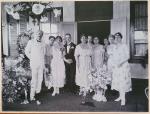
Intermarriage and Family: Survival during War, Occupation and Genocide
The project is built on the conviction that is necessary to examine ‘mixed’ couples’ agency from a comparative, bottom-up perspective. It investigates how personal (e.g. the family) and local (e.g. the nature of ‘mixed marriage’ laws) factors influenced the choices these couples made. The hypothesis is that local factors and family ties played a crucial role in their agency, self-determination and fate under Nazi rule. The project thus paves the way for the recently called-for ‘familial turn’ in Holocaust scholarship which asserts that too much attention is paid to the individual while the family is generally the most intimate social unit holding communities together.
This project is made possible with support from the Veni grant, part of the Netherlands Organisation for Scientific Research (NWO).
